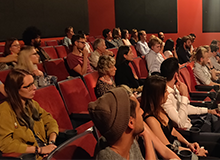This year's environmental screening series explored the subject of climate change, presented through a film screening in Leicester, London and Glasgow to show the documentary An Inconvenient Sequel: Truth to Power. Each screening preceded a panel debate where invited professionals discussed the scientific evidence of the changing climate, explored various mitigation and adaption approaches, and engaged participants in a conversation on how we can effectively fight the climate crisis. In this blog, our Events Lead, Rhianna Jarvis, reflects on some of the key themes that emerged from these discussions and how we can evoke positive action.
Climate change is fast becoming the definitive topic of the 21st century. The UK Government is making significant commitments to become carbon neutral by 2050 and achieve their ‘net zero’ targets by ending the sale of new petrol and diesel vehicles by 2040, furthering their commitment to the Paris Agreement.
It is evident that global concern for a climate emergency is on the increase. We are seeing a rise in climate activism and public discourse, with growing support emerging for global environmental action such as the School Strike for Climate youth movement and Extinction Rebellion (XR).
This year’s environmental screening series explored whether international government activities for adaptation and mitigation are accurately reflecting the severity of the climate crisis.
The film, released in 2017, arrived at a critical moment as the US administration opted to prioritise the interests of fossil fuel corporations over the health of our planet. An Inconvenient Sequel: Truth to Power – released a decade after the original: An Inconvenient Truth – highlights how close we are to a real energy revolution. Former Vice President of the United States, Al Gore, explores the potential renewable energy has in providing a proposed solution to fossil fuels and addresses some of the key barriers that global superpowers have voiced towards this alternative energy. The documentary outlines the urgency at which national governments and society need to act, recognising that the climate emergency could be overcome with a little human ingenuity and passion.
Leicester
In partnership with Octopus Energy, the opening night to this screening sequence invited Leicestershire to bring their ideas and questions to the discussion surrounding climate change mitigation. Joined by Dr Luci Collinwood (Senior Science Officer at the Welsh Government Office for Science), Professor Rob Wilby (Professor of Hydroclimatic Modelling at Loughborough University), Yhasmin Moura (Centre for Landscape and Climate Research, University of Leicester and Royal Society Newton International Fellow) and Sebastian Braeuer (Special Operations Lead at Octopus Energy), the conversation discussed the reliability of climate modelling, the impact global initiatives such as XR have had to date, and the importance of education when encouraging local and global communities to consider their climate impact. The debate concluded with a philosophical question from Professor Rob Wilby on the long-term aims in tackling the climate crisis:
“What do we consider to be the optimum climate condition on planet earth and how will we know when the climate crisis has been resolved?" Leaving scientists, society, governments and industry with the question, "What are we striving for?”
London
In London, we were joined by Fiona Dear (Head of Campaigns at The Climate Coalition), Clementine Cowton (Director of External Affairs at Octopus Energy), Philippe Pernstich (Consultant at Carbon Trust) and Jonathan Casey (Principal Environmental Consultant at Atkins). On the doorstep of Westminster, the conversation naturally turned towards the role of Government. Given that the 26th Conference of the Parties (COP26) will likely be held in the UK in 2020, the Government will be under the spotlight to demonstrate their commitment to addressing the climate crisis following their recent declaration of a climate emergency.

How do we intend to reach the ‘net zero’ target set for 2050? It is well-recognised that fundamental behaviour change can bring about significant innovation. However, in order to achieve this, the appropriate structures must be put in place to enable people, society and business to bring about change. Therefore, it falls on governments to invest in more sustainable infrastructure such as renewable sources of energy and greater resilience in public transport. We cannot and should not be solely expected to tackle this crisis as individuals. Although, there is significant evidence to show that, when given a platform, what was once considered a fad can quickly become incorporated into the norm and generate a significant societal shift. This can be seen in the increasing popularity of vegan and vegetarian diets, and the downfall of single-use plastic consumption. Clementine Cowton drew an analogy to the launch of the smartphone which has led to a revolution of the taxi industry by providing a new platform for companies to emerge. So how can the upsurge in public interest around climate change be captured and used to address the crisis?
Glasgow
Our third and final evening was held in Glasgow at GMAC Film. Joined by James Robb (Senior Sustainability Consultant at WSP), Faye Tester (Environment Manager at SGN), Patrick Harvie (Scottish Green Party) and Charlie Fraser (EV Communities Champion at Octopus Energy). Questions exploring the feasibility of alternative transport, energy supply and agriculture were the focus of the discussion. As previously mentioned, for many people, the infrastructure is not available to make the required changes to transition away from fossil fuels and traditional agricultural techniques. Patrick Harvie used the River Clyde as an excellent example of how Glasgow has the opportunity to capture natural thermal energy. This demonstrates the potential cities have to evolve, develop and revolutionise by encompassing collective approaches with significant governmental support to make alternative options viable. Charlie Fraser discussed the growing market for electric vehicles and highlighted their increasing competition with traditional combustion engines. To encourage a societal shift towards electric vehicles, education is needed to increase people’s confidence in making the change.
The Emergency Response
It is easy to feel demoralised after watching An Inconvenient Sequel and engaging in debates around the climate crisis. However, building the conversation, swapping to renewable energy, engaging in education and increasing pressure on governments has the power to elicit real change. As the documentary highlights in its closing sequence, your voice, your choice and your vote are imperative to stopping climate change. Demand stimulates innovation.
This environmental screening series is part of the wider work we at the IES are involved with. We will continue this conversation and explore whether the proposed actions from the government will be enough to halt the planet's dramatic changes that are already evident.



